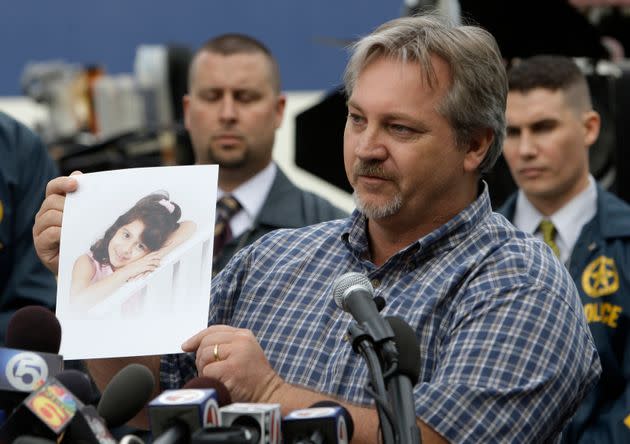A Thanksgiving Massacre In 2009 Highlights Today's True Mass Shooting Crisis
This is an excerpt from our true crime newsletter, Suspicious Circumstances, which sends the biggest unsolved mysteries, white collar scandals, and captivating cases straight to your inbox every week. Sign up here.
For many Americans, Thanksgiving is all about family — for better or worse.
It can be a joyous occasion for families to reunite, reconnect, catch up, and feast on traditional favorites.
For others, Thanksgiving can be fraught — many Indigenous people consider it a day of mourning — and stressful, evoking anxieties about travel nightmares and familial political debates.
For one family in Jupiter, Florida, it’s a dark anniversary.
There were no signs of discord at a family gathering of 17 relatives on Thanksgiving in 2009. After dinner, they stood around the piano for a singalong.
They had no idea their night would end in a massacre.

A photo of 6-year-old Makayla Sitton who was shot and killed by her cousin, Paul Michael Merhige, along with three other family members, sits atop the piano in the living room setup to tape a segment of the TV show "America's Most Wanted," on Jan. 5, 2010, in Jupiter, Florida.
The 2009 gathering in Florida spanned three generations: Raymonde Joseph and Dr. Antoine Joseph, a couple who had been married more than 50 years; their daughter Muriel Sitton, who was hosting the party with her husband, Jim; and their daughter, 6-year-old Makayla Sitton.
Antoine Joseph’s sister Carole Merhige was also there, with her husband, Michael Merhige, and their three adult children: Paul, 35, and his 33-year-old twin sisters, Carla Lynn Merhige and Lisa Ann Knight. They were about to see a third generation of their family too: Lisa and her husband, Patrick Knight, also a guest, were expecting their first child.
Muriel Sitton later said in court documents that she was shocked to hear that Paul would be attending — the year before, when the Josephs were hosting Thanksgiving, her father expressly forbade him from joining them. The Sittons didn’t invite Paul this year — his father did, which Muriel learned when she overheard a phone conversation between Michael and Paul as she was setting the table.
For four people that night, it would be their last meal.
<hr width=50%>
Paul arrived at the Sittons’ 90 minutes late, joining them just as they were sitting down to eat. But he didn’t eat anything and just sat there quietly, relatives later told investigators.
Paul was reclusive and had been unable to work after being diagnosed at age 19 with severe forms of depression and obsessive-compulsive disorder. Before then, however, he was “vivacious,” friendly and well-liked. He was an honors student at a prestigious private school in Miami, smart but not bookish. He attended parties and dances and played varsity sports, including football (he was a kicker), baseball and soccer. He devoted his senior yearbook page to his family, thanking his parents for “all that you have given me” and “all 32” members of his extended family, including grandparents, aunts and uncles, and cousins, saying, “I love you now and will forever.”
To Lisa and Carla, he wrote, “I have been so lucky to be blessed with having twin sisters and being your protective, older brother.”
After he shot and killed them, Jim Sitton later said, Paul said, “I’ve been waiting 20 years to do this.”
And then he reloaded his gun.

Twin sisters Carla Lynn Merhige and Lisa Ann Knight were killed by their brother, Paul Merhige, on Thanksgiving in 2009.
As Paul grew older, his relationship with his family deteriorated and he began to show signs of mental illness. His mother said he had a “nervous breakdown” when he was 19. Since his diagnosis of severe depression and obsessive-compulsive disorder, the Sun-Sentinel reported, he was unemployed and financially supported by his parents, and lived with them until the year of the murders. They bought him a car and paid for his Miami apartment when he moved out. According to court records, he had a documented history of threats, violence and suicide attempts, including shooting himself in the chest.
Today, 14 years later, mass shootings involving family members have grown into a crisis. Just last weekend, a Tennessee man was found dead after targeting five women in his family.
Most mass shootings in America happen behind closed doors in the home, and are anything but random. In fact, most victims of mass shootings know their killer personally.
In 2006, Paul’s sister Lisa filed a restraining order against him — which she later withdrew — because he threatened to kill her. According to a lawsuit filed by the Sittons, Paul had also been violent with his mother.
Still, Paul was able to purchase four firearms the month before the massacre, said authorities, who shared surveillance video they said showed him looking at a rifle in a gun store.
Paul didn’t have a gun, his relatives later said, when he joined them for a singalong at the piano. Makayla Sitton gave the guests a preview for her planned performance in “The Nutcracker” the next day, before she was tucked into bed wearing her Tinkerbell pajamas.
At some point after 9 p.m., Paul went out to his car and was gone for about 20 minutes, his relatives told investigators. When he came back inside, he had a handgun and started shooting.

Jim Sitton holds up a photograph of his 6-year-old daughter Mikayla during a news conference about an international manhunt for Paul Merhige in Miami Beach, Florida, on Dec. 22, 2009. Sitton's daughter was one of the four victims.
According to audio and a trove of court documents released after his arrest, Paul didn’t say anything before he started firing. He shot his aunt, Raymonde Joseph, in the shoulder, and while her husband tried to stop the bleeding, Paul shot her again, point-blank in the chest. His gun jammed when he tried to shoot his uncle in the head, survivors later said, but he continued on, fatally shooting both his sisters, Carla and Lisa. Lisa was pregnant. He didn’t shoot his parents.
Hours earlier, when Paul confirmed he was coming to the Sittons’ gathering, his mother told Lisa, “I hope he doesn’t come and kill us all tonight,” according to a police report.
“Mom, it came to my mind,” authorities said she replied. “But don’t say that to Dad because Dad would get upset that we had such ideas.”
Paul also shot a cousin, Clifford Gebara, 52, who was just grazed by a bullet, and Lisa’s husband, Patrick Knight, 37. He was critically wounded but eventually recovered after being in a coma for three months.
Paul then made his way to Makayla’s bedroom. Patrick Knight told authorities that after shooting the little girl, Paul came out of her room, but then immediately turned around and shot her again — “I guess to make sure she was dead,” he said.

"America's Most Wanted" host John Walsh (left) hugs Muriel Sitton as her husband, Jim Sitton, looks on during a segment of the TV show at the Sittons' home. Muriel Sitton's cousin, Paul Michael Merhige, had been in hiding since shooting four relatives on Thanksgiving night.
Seconds later, Paul walked out of the house, got into his blue Toyota Camry, and drove away. He eluded authorities for 38 days before he was captured on Jan. 2, 2010.
That night, Paul was featured on an episode of “America’s Most Wanted,” which the owners of the Edgewater Lodge in the Florida Keys happened to be watching. Despite his shaved head and beard, Paul and Melinda Pfaff recognized himas a guest at their small waterfront motel. They immediately called the show’s hotline, saying a man resembling Paul had checked into the motel on Dec. 2, 2009, using a fake name and paying in cash. When U.S. Marshals burst into his second-floor room, they found materials suggesting that he might have planned to kill himself. He surrendered without resisting.
The Pfaffs later received a $100,000 reward.
<hr width=50%>
Months after his arrest, Paul called his father from the Palm Beach County jail, begging him for forgiveness, according to released audio recordings.
“We have nothing. You have nothing,” Michael Mirhige replied. “It’s a total nightmare. Our lives have changed forever.”
But it wasn’t Michael’s first experience with “familicide.” In 1973, a year before Paul was born, Michael’s sister, 43-year-old Miami opera singer Salwa Merhige-Abrams, also did the unthinkable: After her final divorce hearing from her husband, pilot James Abrams, 45, she fatally shot him and their two children, Jack, 14, and Melissa Ann, 10, before killing herself.
Prosecutors had originally sought the death penalty for Paul Merhige, but eventually offered him a plea deal — which enraged Makayla’s father. Jim Sitton, a photojournalist for a local news station, begged on his knees in the courtroom for the judge and prosecutors to reconsider. Paul, then 37, was ordered to serve seven consecutive life sentences in prison.
The Sittons and Patrick Knight filed lawsuits (later dismissed) against Paul’s parents for negligence, claiming that they deliberately did not tell the Sittons that they had invited their son or warn them that he was coming.
Instead, the Sittons said, they opened the door to an “uninvited interloper” who tried to murder at least seven relatives.
Above those injured and dying relatives on Thanksgiving 2009 hung a stringline with cheery cards. On each one, Makayla had written a note saying how grateful she was for her family.
